At an International Lesbian and Gay Association conference, delegates gathered from more than one hundred countries to report on the condition of LGBT life. Among the leaders was Sunil Pant from Kathmandu, Nepal, head of Blue Diamond Society. I spoke to Sunil and listened to his confident voice describing the difficulties of fostering pro-gay understanding in Nepal.
Also see:
Gay Nepal News & Reports 2000 to present
Gay Nepal Photo Gallery

By Richard Ammon
Updated December 2013
Note: since this original interview, Sunil Pant has became the first openly gay politician to be elected in Nepal after the revolution that abolished the monarchy. Thanks to his working with Blue Diamond Society, Nepal became the first country in the world to recognize the third gender. But in 2011 and 2012, the nation was still undergoing transition and Sunil and others attempted to add inclusive language into the newly drafted Constitution. However, negotiations among political factions failed in the spring of 2012 and the implementation of the interim constitution was placed on hold until new elections could be held. After 12 years of arduous work Sunil stepped down from the leadership of Blue Diamond as Sudeep Bahadur Singh became the director in 2013.
From Kings to Queens
Until 2006 Nepal had a tightly sealed government wrapped around the person–and whim–of the king who suddenly came to power in 1998 when his predecessor and other royal family members were murdered. After his ascension to power he succeeded in alienating politicians and the general populace alike by assuming near-dictatorial authority. Finally in May 2006 there was a huge uprising and rebellion against him and he was forced to surrender most of his power to the parliament. An uneasy but pragmatic peace was subsequently made with the insurgent Maoist rebels and the guerrilla wars have stopped; a new constitution was written that reduced the king’s position to a figurehead.
Within such tensions and within a firmly heterosexist society, leading activist Sunil Pant forged ahead with the Blue Diamond Society gathering and offering support to the LGBT Nepalese community–mostly men, some visible lesbians and ‘third-genders’. With a shoestring budget virtually all the activities are grass roots and voluntary. Over time, advocacy and lobbying for improved human and gay rights were persistent and determined. As a result, Nepal’s law now bars any discrimination based on sexual orientation
In 2007 Nepal’s Supreme Court ordered the government to scrap all laws that discriminated against people based on sexual orientation or gender identity, ensuring equality for the country’s LGBTI population. The court also mandated that the government form a committee to study same-sex marriage.
Away from such lofty ideals, Sunil was concerned with high drama involving a young lesbian whose family found out she was gay and had been beating her. When she tried to run away with her girlfriend they had been found by a relative and beaten some more and dragged home where her mother tried to poison her. She had to be hospitalized for medical and protective reasons. Sunil wondered out loud to me how Blue Diamond might find the young woman a paid position out of harm’s way in Kathmandu. (A previous incident between two young lesbian lovers is reported at: http://www.ilga.org/Information/legal_survey/asia_pacific/nepal.htm )
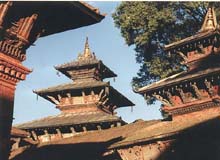 My Experience
My Experience
My time in Nepal revealed a country left behind in time, a mystical and mysterious culture cut off from modern transformations-economic, political and humanitarian. Ancient Buddhist monuments in Kathmandu crowd close to ornate pagoda-style architecture that is both delightful and decrepit. I saw the late king and queen in person watching over the ritual of Indra Jatra, a September festival that involves pulling chariots containing a small child-gods through the narrow cobbled streets. I came within inches of being run over by the one-ton wagon as it was dragged hastily by a hundred young men.
Otherwise, as a visitor. I encountered curious friendly faces of gentle demeanor. Outside the capital city I stood in the Himalayan foothills in awe of the shifting mist as it wrapped around great peaks and snaked through valleys. Along the river banks funeral ghats smoked from the cremation fires of the dead while naked little boys frolicked in the shallow water. Wandering Hindu yogis and ascetics with matted hair and penetrating eyes sat cross-legged talking to plaintiffs with mortal questions. I wondered what advice would be proffered to a young lesbian looking for validation!
All this seems so far away in time and place from Sunil Pant’s early work in 2001 getting Blue Diamond started. At first there were small private chats with guys cruising in a park. Sunil realized they knew little if anything about HIV and AIDS. With some funds from UNAIDS he provided safer-sex leaflets and condoms to the men, some of whom warmed to his purpose and message. Support groups formed that led eventually to Blue Diamond’s formation (see interview that follows here) whose current outreach has reached thousands of LGBT Nepalese people. Their activities are listed on their web site: http://www.bds.org.np/
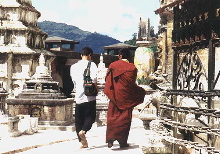 Since its formation Sunil has quietly lobbied police and military chiefs about the existence of homosexuals and advocating tolerant attitudes. This work has paid off unevenly. On occasion local policemen have harassed gays or tried to blackmail them. An April 2003 raid on a mixed-gay disco (see News & Reports on this site: #3) resulted in the ‘Stonewall’ of Nepal when gays and transvestites fought back against being roughed up. More police were called; a policeman’s ear was bitten off and a ‘riot’ ensued. Sunil was called at four AM to help free the men from jail but first he called a news reporter and then a lawyer. It was front-page news the next day and was carried on the wire services across the world. Sunil told me that the police chief later expressed regret and pledged to sensitize the police force about gay people.
Since its formation Sunil has quietly lobbied police and military chiefs about the existence of homosexuals and advocating tolerant attitudes. This work has paid off unevenly. On occasion local policemen have harassed gays or tried to blackmail them. An April 2003 raid on a mixed-gay disco (see News & Reports on this site: #3) resulted in the ‘Stonewall’ of Nepal when gays and transvestites fought back against being roughed up. More police were called; a policeman’s ear was bitten off and a ‘riot’ ensued. Sunil was called at four AM to help free the men from jail but first he called a news reporter and then a lawyer. It was front-page news the next day and was carried on the wire services across the world. Sunil told me that the police chief later expressed regret and pledged to sensitize the police force about gay people.
However, a few months later another incident involved hoodlums who attacked a gay couple. The situation was compounded by police who roughed up the couple instead of arresting the attackers. So the work of Blue Diamond goes on against daunting odds, against widespread ignorance and brutality and virtually no understanding about homosexuality or the social and personal issues associated with it.
Interview with Sunil
This is taken from ‘Trikone Magazine’—Lesbian, Gay and Bisexual South Asians
=When did you first start thinking about starting Blue Diamond Society?
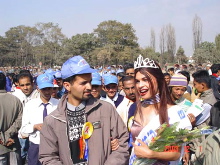 Sunil with Pride Marchers Sunil with Pride Marchers |
When I went back to Nepal after spending 6 or 7 years in India and Byelorussia. I was then working with a women’s project creating and manufacturing handicrafts. We had connections in New York City.
Being gay I knew about cruising spaces in Nepal. But I found there was nothing else there—no support for men who had sex with men, no groups, nothing. Instead there was a lot of violence against gay men, family pressure to get married and leading double lives.
I thought the basic thing would be talk about safer sex issues at least. I asked my connections in New York to send some condoms and safer sex materials which they did. Then I started doing outreach in cruising areas. Slowly people felt comfortable coming and talking. After six months of doing this we decided to form a group.
=Why did you feel you needed a group?
I felt we needed more support. I was dealing with local cruising spots where people weren’t educated. We need economic assistance. So we contacted NGOs working with HIV/AIDS like UNAIDS. We had already found a significant amount of risky behavior. And a lot of men were married. So it affected their wives too. So we got together some money and trained 16 outreach educators. Then we decided to meet as a bigger group. We had a consultation meeting with UNAIDS and after 3 days of meeting we got the money for a drop-in center. That’s when we set up an office and a drop-in center.
=How big the office?
We have a staff of 23 now. We do all kinds of things like developing a hotline and a drop-in center. On Fridays we will have a gay movie. We have an STD clinic and have developed leaflets in local languages in condom usage for MSM sex.
=Why the name Blue Diamond?
That comes from the years I spent in Russia. In the Soviet Union people would ask ‘Are you blue?’ That was a way of asking if you were gay. And the diamond is from Buddhism. People who are compassionate and enlightened—we call them diamond beings.
=How did you find out about the cruising areas in Nepal?
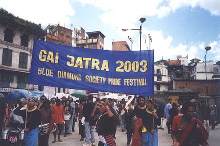 Before going to Russia I would sometimes cruise on my own. But I didn’t have sex. I knew the parks where people would go to cruise though. There was a small park in the middle of the Kathmandu valley. People would cruise there from evening to late night. There could be 100-200 guys in that one small park every night. It was in the tourist area—so there were a lot of hotels around. Also the travel buses would come there.
Before going to Russia I would sometimes cruise on my own. But I didn’t have sex. I knew the parks where people would go to cruise though. There was a small park in the middle of the Kathmandu valley. People would cruise there from evening to late night. There could be 100-200 guys in that one small park every night. It was in the tourist area—so there were a lot of hotels around. Also the travel buses would come there.
The problem was police harassment. Especially from people who claimed to be police but were never in uniform. They would say we will take you to the police station unless you pay us. Now people are getting more aware. They know that unless you are caught penetrating no one can do anything to you. But once I saw the policeman had pulled out his dick and trapped a guy. I caught them and said that was entrapment. I tell the guys not to be victims and just pay the money. Instead they should scream loudly and ask for help. Otherwise it is terrible. Sometimes these “police” would follow the guy home and then blackmail them. Guys would end up giving them their TV, VCR and refrigerator.
=Has your organization had any confrontations with the police?
A few months ago there was a Red Cross conference in the city and they asked us to perform. Some guys who were in drag decided to go to the disco. On the way back they were caught by the police on the street. The cops kept them for hours. They asked them to pull up their saris and stuck their dandas (batons) up their ass. The guys lost their money and gold chains. They called me in the middle of the night. I went to the police and say if you don’t give the money and chains back, I’ll take photos of the bruises and give it to the press. Then they changed their tune.
=But what has the press been like on these issues?
It can be very homophobic. I remember three years ago some guys were taken by the police from a disco. They were made to put on drag and makeup in the morning and asked to walk on the streets. The police taunted them saying “These are homos, cock suckers. They are diseased.” The police called the press and their photos were published as fakes who try to cheat men by dressing as women. That was such shame for their families. The police only released the men after a week after some of their friends got together some money.
So we have been trying to talk to the press about human rights. There have now four or five articles. We also try and talk to different ministries but they are still convinced there are no homosexuals in Nepal.
=Is there no local word for it?
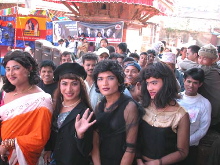 There is Ma-runi which means feminine men. They would cross dress and even serve in the army and perform dances. Even the royal family invites them to perform. People think it’s good luck to see them. But no one wants them in their families. They are feminine but people don’t think about them sexually.
There is Ma-runi which means feminine men. They would cross dress and even serve in the army and perform dances. Even the royal family invites them to perform. People think it’s good luck to see them. But no one wants them in their families. They are feminine but people don’t think about them sexually.
=So how do men find each other?
Expatriates and high class people who have been abroad go to bars and discos and have private parties. There are no gay bars but there are a few places that are a little cruisy where you meet college boys or tourists. Also people meet through the Internet—I think there are 4 or 5 e-groups. You will see emails there from people saying they are arriving on such and such flight at such and such time or going to places like Pokhara and want to meet people.
But there is another class who are poor and working class and just go to the local cruising areas. In terms of identification there are a few who are feminized. We call them meta. Their top partners are called ta. But once they have been in the scene for a while they become meta too. But the scene is not very visible. It will take you a while to realize that a place is a cruising place. Unlike in India people are not so aggressive while cruising.
=Do most of the men get married?
Yes, they think they will just have sex with men before marriage. But most of them end
up having sex with men after marriage too. Very few wives know. Even the ones that do still stay with their husbands because divorce is such a big stigma A lot of men say that they stop having sex with their wives after getting married and having children.
=Is religion an issue?
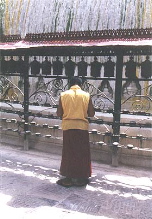 It’s mostly Hindus and Buddhists in Nepal. Religion is quite flexible there. There is some same sex stuff in Tibetan culture. When I go to temples I can see stone and wooden same sex carvings. It’s been there for a long time in religion. We call them mit and mitni— man-man woman-woman friendships. You go to a temple, find a witness and exchange flowers. That’s quite accepted by society. Mits share everything including the bed. It still goes on in the countryside. I think it’s much more than deep friendship.
It’s mostly Hindus and Buddhists in Nepal. Religion is quite flexible there. There is some same sex stuff in Tibetan culture. When I go to temples I can see stone and wooden same sex carvings. It’s been there for a long time in religion. We call them mit and mitni— man-man woman-woman friendships. You go to a temple, find a witness and exchange flowers. That’s quite accepted by society. Mits share everything including the bed. It still goes on in the countryside. I think it’s much more than deep friendship.
=How has the gay or MSM community reacted to an organization like Blue Diamond talking about homosexuality?
When we started, guys from the community were scared to be on the board. So initially it was my father, my sister, and her husband. After a year they resigned when people from the community came on board. Our NGO is regarded as a sexual health program for men. That made it easier for them. Now the same guy who was once scared of being on board, wants to talk to the press all the time. So things are opening up little by little.
It’s not talked about unlike in India where people speak about it. Also in India the cities are so big. There are a lot more platforms for gay people. Nepal is a small place. You go cruising and you find relatives passing by. In Nepal people say why make it an issue, we are happy this way. Many middle class gays are married with children and don’t want this to become an issue. But newer guys are more concerned about their future and rights. Some guys even think they can face the family pressure and not get married because they have seen what miserable lives some of the married guys lead. But a lot of guys who come to our center also think it’s a hormonal disorder and want to know if there is a cure for it.
=Are you yourself out?
(Laughs) It’s not spoken. But there are articles in the press which refer to me as the Director of the Blue Diamond Society working with gay people. So my family obviously knows. I also started a gay travel agency that f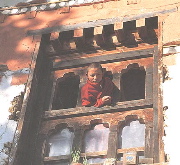 ocuses on gay tourists and my brother actually handles that. We had two gay tourist groups before the government imposed the emergency (due to violence with Maoist guerrillas). Blue Diamond also provides jobs for gay people as guides.
ocuses on gay tourists and my brother actually handles that. We had two gay tourist groups before the government imposed the emergency (due to violence with Maoist guerrillas). Blue Diamond also provides jobs for gay people as guides.
But the best thing is as the word gets out a lot of people visit from other cities because they have heard about Blue Diamond. They want to come and see our offices arid they want us to go to their cities. So things are changing in Nepal.
















